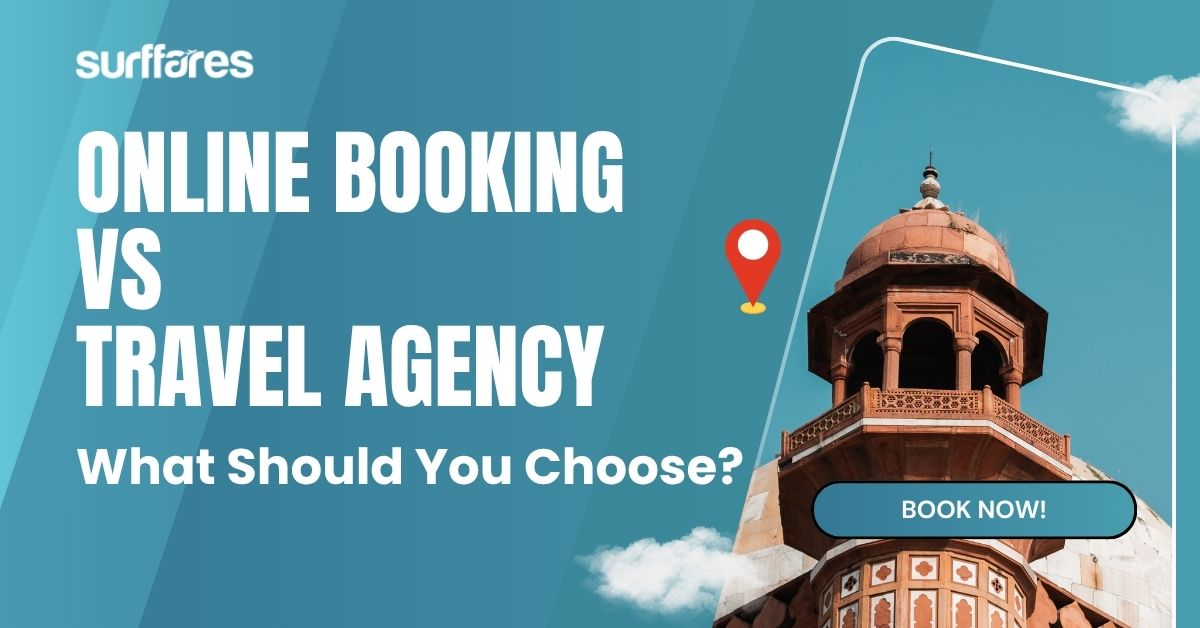Online Booking vs Travel Agency: What Should You Choose?
Every trip begins long before the suitcase is packed. It starts with a decision—how to book it. Do you go online and handle everything yourself? Or do you call a travel agency and let them take care of the details?
It’s a choice every traveller faces. Some people love the freedom of online booking. Others trust a travel agent for peace of mind. Neither option is perfect, and neither is wrong. The best one depends on who you are as a traveller and what kind of trip you’re planning.
Let’s explore both sides, compare them honestly, and see if there’s a middle path that works better than either.
The Rise of Online Booking
Not long ago, booking a trip meant walking into a travel agency. You’d sit across from an agent, explain your plans, and leave with a printed itinerary. That was the norm.
Today, things look very different. With platforms like Expedia, Booking.com, Skyscanner, and Airbnb, online booking has taken over. Most travellers—especially younger ones—head straight to their phones or laptops.
And it’s easy to see why.
The Benefits of Online Booking
- Convenience: You can plan your trip anytime, anywhere. On a train, in bed, during a lunch break. No waiting for office hours.
- Choice: Online platforms show you thousands of flights, hotels, and packages. You’re in control of what you see.
- Price comparison: Filter by cost, duration, reviews, or amenities. If saving money is the goal, the internet makes it simple.
- Instant confirmation: Book now, get your ticket or reservation now. No back-and-forth emails.
Real reviews: See what other travellers experienced before you commit.
The Downsides
But online booking has its cracks. Too many options can feel overwhelming. Ever opened 12 tabs just to compare hotels? It’s exhausting. Hidden fees can also turn a “cheap” ticket into an expensive one. And when things go wrong—a cancelled flight, an overbooked hotel—help is often limited to call centres or automated chatbots.
So yes, online booking puts power in your hands, but it also puts all the responsibility there too.
The Role of a Travel Agency
On the other side, we have the traditional travel agency. Some people assume travel agents are outdated, but that couldn’t be further from the truth. In fact, many travellers—especially those planning complex or special trips—still find huge value in them.
The Benefits of a Travel Agency
- Personal service: A travel agent doesn’t just sell you a ticket. They take the time to talk to you about your wants and then build an itinerary that meets your budget and preferences.
- Expertise: Most agents know their destinations well. They know which hotels are being refurbished, what airlines have the best level of service, and which tours are worth your investment.
- Time savings: Instead of hours of searching online, you tell them what you need—and they handle the rest.
- Support: If your flight is cancelled or your hotel has a problem, your agent is a phone call away. Real help, from a real person.
The Downsides
The main drawback? Cost. Travel agencies may charge you fees, or there may be prices slightly higher than you see online. However, many people think that the additional service and comfort is worth it.
Which Option Works Best in Different Situations?
Let’s make this real with examples.
Honeymoon Trips
A couple planning their honeymoon might start online—but quickly feel overwhelmed. A travel agency here is priceless. They can suggest romantic resorts, arrange extras like spa treatments or champagne on arrival, and make sure everything runs smoothly.
Family Holidays
Travelling with kids? Online booking lets you filter for “family-friendly” hotels, but only a travel agent knows which ones actually live up to the claim. They’ll also handle details like transfers, child-friendly tours, and meal plans.
Business Travel
For a simple domestic flight, online booking is best. However, if you have a business trip that includes multiple destinations and deadlines, a travel agency makes sense. An agent can manage on-the-go changes and be there as a professional backup in case your plans change.
Adventure Travel
Backpackers generally prefer online booking, which offers flexibility, and affordability, and ideal for finding hostels or budget stays. However, a travel agency creates reliability when booking safaris, trekking, or expeditions in remote locations because of the safety and expert connections they have access to versus booking online.
The Hybrid Approach
Here’s the thing: it doesn’t have to be either-or. Many travellers use both.
They research online to get a sense of prices and reviews. Then they consult a travel agency to finalise the itinerary. Others book flights online but rely on a travel agent for hotels, tours, and extras.
This hybrid approach combines the best of both worlds—the flexibility of online booking and the reassurance of professional support.
Conclusion: Online Booking, Travel Agencies, and Surffares
So which is better? There’s no one-size-fits-all; it depends on your preferences! If you are comfortable, independent, cost-conscious, resourceful and prepared to take care of the planning, go with online booking.
If you want a vacation expert to offer recommendations, tailored services, and guidance, then travel agents or their hybrid counterparts will be worth the money.
Platforms such as Surffares combine the best of both worlds – attractive prices, an intuitive booking tool, and 24/7 customer service support. Surffares incorporates the value of online booking with the assurance you would receive at a travel agency.
Surffares is especially popular for routes like the USA–India or Canada–India. On these longer routes, the price and trust factors come into play.
Ultimately, the best option is the one that allows you to travel with minimum stress.

 +1-844-211-1766
+1-844-211-1766 CHAT NOW
CHAT NOW 